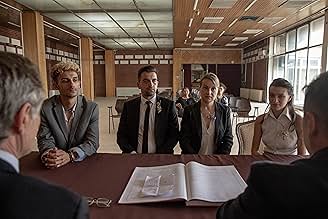Dita is a white woman with a gypsy lesbian lover Suada, and Suada's daughters by different fathers - Vanessa in grade 9, and Mia aged 5. Also in the apartment is Dita's white gay friend Toni, and his new boy-toy, the gypsy Ali. Both Suada and Ali hail from Shutka, the gypsy (Roma) municipality, and at times Ali manages to play fixer.
Aware that she may die of cancer, and having experienced racial discrimination in earlier life, Suada tries to get her girls to recognize Dita as mother and Toni as father, and even gets Toni's name on their birth certificates. But when she dies, Mia bonds with Ali, while Vanessa rejects this family, wanting either to "go home" to grandma, or to marry a boy who is going abroad.
This film likely hits themes that are more relevant in North Macedonia than in Canada, but still is an interesting exposition of the life of minorities. There are dual themes of discrimination by ethnicity and sexuality. There is a brief scene where Dita "straightens out" her living room and Toni, expecting police to show up after Vanessa acts out. But the scenarios are believable, and the performances good, especially Mia, whose role was written well for her.
The dialog in Shutka is tricky, as there is Romany mixed in, and the subtitles don't show the language differences, making me scramble to try to figure out what language was being spoken. Also, some of the hand-held camera work was a bit shaky.































